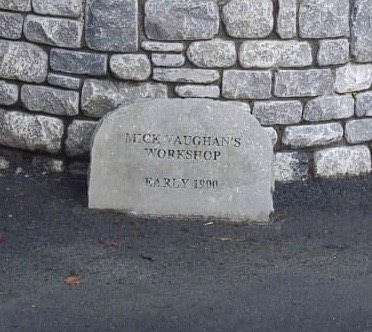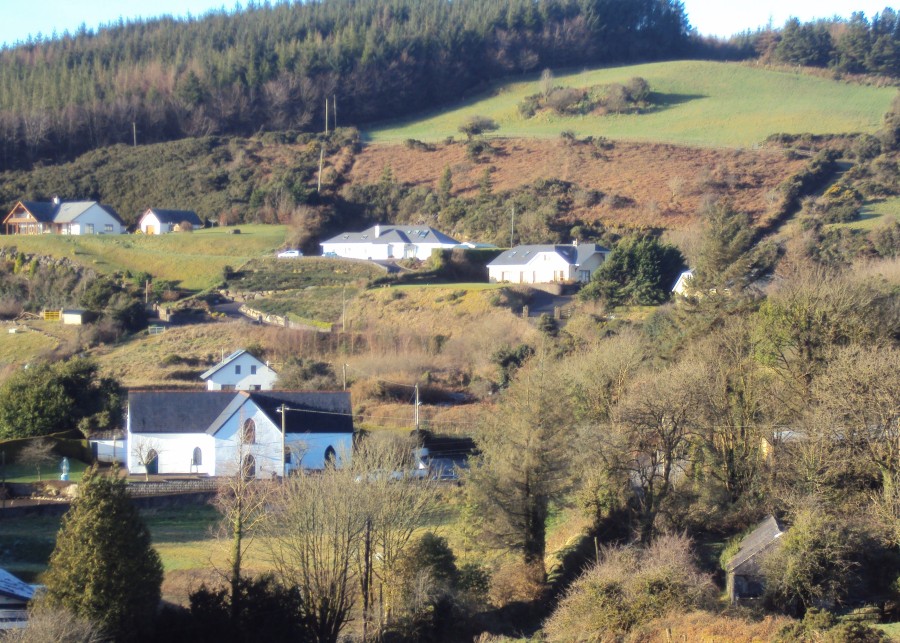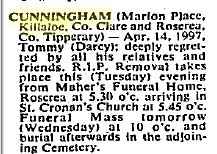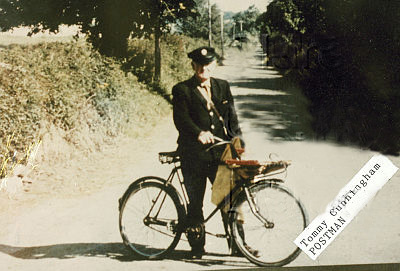Tommy was born in 1915 in Roscrea and he came to Killaloe in 1951. He was a postman for 41 years in Killaloe and the Ogonnelloe area until his retirement in 1980.
You can listen to Tommy’s full interview here through Soundcloud!
Tommy was a Postman in the area for, how many years Tom? 41 years.
Now Tommy, would you like to continue and tell me about when you first came to Killaloe, where you lived and what post district you had?
When I came to Killaloe first, was in 1951, and my first place I stopped was in Hogan’s in Ballina, he was a bus-driver.
Where exactly was that?
Tis there where Freda Whelan is living now, Wards lived in it one time, and Hogan’s lived in it afterwards. And then I was in hospital in Raheen for eight months, with a belt I got in the shin.
From Hurling?
No, but I skidded and the doctor told me, this fella, ah he was a regular, he was a terrible nice doctor, up there in Raheen anyway for eight months. And after that I came home, back to my work again, and I stopped in Mulcahy’s in St. Flannan’s Road, I stopped in Guerin’s, that’s Danny Guerin’s now in St. Flannan’s Road, they have new houses there now, remember the American fella.
And where else – I stopped with Byrne’s, abroad in Newtown. I had no place to go, I was often out on the road at six o’clock thinking to where I was going to sleep the next morning. I stopped in, the best digs I ever got in Killaloe, I enjoyed every bit of it, was Mrs. Doyle, Mary Ann Doyle, in the Green, do you know Alice, her mother, you had heat, you had everything, good food, good everything, and that’s the only place that I ever could say that I enjoyed myself, between the old man talking about Australia, snakes and things. He was very interesting.
What year did you come to Killaloe? ‘51
And where was the post office then?
The Post Office was Miss Hehir. I got some terrible great yarns about Miss. Hehir, she was tough. Only in regards to her, in my mind she was one of the most honest people that I ever worked for. She may have a big mouth and give out to you but that’s all it’ll ever go, you know. That’s a woman in that kind now.

Was she an old woman?
Fairly old yes, she must have been a beautiful looking woman in her day because she had beautiful features and things like that.
How many Postmen were there when you first started?
I could nearly name the postmen – there was Tommy Grimes R.I.P., you had John Collins, he lived in New Street, his daughter is married to Fitzgerald now here, and there was Tommy Cassidy, which afterwards met with an accident out in Ryninch and I think was treated very bad by the Post Office. I was in Mass one day and I asked him to know how he was getting on, you know. Well says he “Tommy put down you hand there and feel the calf of my leg” and I did. Oh God I don’t know how he stuck it, the bone was coming out there, you could feel the bone coming out through the flesh. Sure, he didn’t last long after, sure you couldn’t! He was a good Postman, a very good Postman, Tommy Cassidy, I must admit that.
How many of you were there altogether Tommy? Tommy Grimes, Joe Kissane, myself, Cassidy, ah, about five postmen.
And what route did you do? I done Ogonnelloe, the first one.
And my first time, I was going up along the street there, just at Jimmy Minogue’s, now where Sullivan’s is, the first shop there, near the Kiosk, and this woman ran out and she hit me a crack, you know, and I didn’t know says I, what’s this at all, this isn’t a nice thing at all, what in the name of God is wrong with this woman and poor old Maggie Gleeson, a nice one and I was her best friend after and all this sort of business.
Then Tommy Walsh, the bicycle man lived where Tom Cooney lives, and then the Barracks was next, Sergeant Mc Guinness lived in that street too, also Superintendent Lavin lived in it, next-door where Minogue’s is now, and then you had Doyle’s, and Joe you had a Supermarket there for a while, and then you went down and you had Martin Edmonds, and ah…after that you had Connors, and then there was a pub there, across where the Fire Station is, there was a pub there, Josie Hogan’s, whether it was there or down a little bit further, I don’t know. And then there was a Shoe-maker there, which was a great character, Jack Kissane, you’d go into him and you’d say “have you me shoes done” and he’d say “I’ll have ‘em done next week”. He was a great character and a good man on the stage, I believe.
Well I knew the rest of them and ould Mickey Brien’s father, he was always meeting me at the top of the street and of course, he came from Newport, and he’d always meet me and ask me to know who won the match yesterday. I’d say “Tipperary won”, “when you go down town to Paddy Gissane’s, say he, “will you tell him that I had £2 on them”.
So that’s the way. So, from there down you had Lynch, Superintendent Lynch, and you had Edmonds, Eddie Edmonds lived in one of those houses where Hogan’s live now, the other one Pat Reddan and Mrs. Lynch, the Schoolteacher. Then you went down further, you had Mrs. Nihill, they were stonecutters, they lived where the little wall is now, I don’t know who lived in Mrs. Doyle’s place, whether it was her, I think it was. An then you had Prendergast, he was a Cashier in the Bank, where that woman is living now, do you know that big house there, then you had Frank Keogh, the Vet, then you had Le Froy, that lived up there, you know where the Parish Priest is living, up there, Le Froy.
That wasn’t the Parish House then?
No, they lived up there. I don’t know now, I think that woman is there a long time, I can’t remember anyone else there anyway.
Where, in the Lodge House? Mrs. Bosworth. I think she’s here a long time.
Yea, I can’t remember anyone else there, she’s here a long time.
Now Tommy, we’ll keep on the Post Office. You cycled! Oh I cycled, yea.
The Post Office supplied your bikes, did they? They did, yea.
And they paid for all the maintenance and repair? Who did all maintenance and repair on them?
I don’t know about doing them, you had to send them into Limerick and they’d send you out a reserve one.
Did you ever have to manage without your bike? Oh, I did.

You had to walk?
Oh I did. I often had to in my time, tie it with twine and you’d be waiting for a part for months, pedals and everything. One place I used to go out to, Mick Vaughan, he used to have a little bicycle place, with clocks and everything, do you know where Keogh’s of Ballyvalley live, there was a little house over there before you go to Ryan’s, I think it’s there yet, but there’s all trees around it and bushes.
You mean on the left-hand side?
On the right as you go out. Do you know before you go to Ryan’s? Whether it’s there or not now, I think Mick Keogh owned that. He makes out that he owns it anyway, I suppose he does. Across the road from Varley’s, I think it’s right in. But he used to be tricking with ould watches and clocks and everything, but there’s where I used mend my bike, when I’d be broke down there. Mick was a great character.
And did you go out Tommy right into Ogonnelloe village?
Well they had no village there. I went out for miles around, I went over in to Eoin Hayes’s, as you go down the Blacksmith’s shop there, Nora Bodkinson. I went cross fields into places. And I used to have to go up to Paddy Conway’s, Sonny Grant has a Garage there, before that there is a lane there leading up to Johnny Curtin’s and McKenna’s, she’d be a relation to the Gavin’s and they lived off up on top of the mountains. I can’t remember his name now……Paddy Jim Curtin, they lived up there. And then there was Paddy Conway.
Would you have post for everybody every day? Well not every day but mostly that time.
And if you had only one letter for that area out in Ogonnelloe would you still have to go?
Oh, you’d still have to go. Oh, there’s no doubt about that.
You’d have to go up as far as May O’Brien’s, I think she died and a fellow of the Guilfoyles’ used to live there, and Sonny Brien. And then you had a great old friend of mine, he died, he was in America, he worked in McKeogh’s in Ballina years ago, then he went to America and joined the American army, Willie Stritch. He worked in McKeogh’s, I don’t remember him working in McKeogh’s but that’s what he told me before he went in the Army. But he was one decent fellow, you know. You had to come back then and you had to go down Ballyhurley, that’s Costelloe’s.
You had Pakie Lynch, the School teacher there, I was always very great there, I always got the tea there, he’d always say “look under the mat and you’ll get the key and go in and make your own tea”. Ah she very nice, a very nice woman, Eileen Meade was her daughter, she was only married for a very short time. And she’d be Mooney, Mick Mooney and all, they lived down the lane too and they’d be relations of Callaghans.
And how did you come to hurl for Ogonnelloe?
Well I left Killaloe and I was asked then. I was forty-five years of age you know, and I said I would but I was feeling in good health and good form and I hurled for Ogonnelloe. Everything was going good for me and the funny part about it, I had the Gael Linn one day I used to back Gael Linn, you know put a shilling on Gael Linn, back the teams and I had Ogonnelloe and I had the team I was playing with and I didn’t know it.
The score was ten three to nothing, that’s what we won the County Championship, ten three.
And you got a medal for that?
I gave my medal to Dominic Stewart, Dan Stewart’s son, he got Polio, himself and Noel, they got Polio years ago, you know. Dominic had a little limp, he was an engineer in America I think for a long time. A beautiful family, there’s no doubt about it, every one of the Stewarts were wonderful people.
And then that was up Ballybrogan, little Mick, I used to deliver to him, Mick McKenna, did you know him? He lived up that road. And then you a fella by the name of honest Mike, that lived above passed Stewarts all together!
Do you want to know anything else?
What year did you win that medal? 1960.
And I was coming out the door after going up to work and I was met by Fr. Woods. “What did you win? I heard your name on the wireless”. “I think you’re codding Fr. you must be mistaken” says I. “Oh no” says he “I heard your name”.
I don’t know whether t’was £200 or £100, I can’t remember any and I couldn’t make out who I bought the ticket off or who was in the game even, but sure, t’was Mrs. Costelloe abroad, the Post Office, that’s who I bought it off, Margaret Costelloe, she was the post mistress that time.
And you were still living in Killaloe then and you were allowed hurl with Ogonnelloe?
Well…..they claimed me as their own anyway to tell you the truth.
And was that the only Championship you ever played?
I played in the semi-final of the Senior Championship here. I was just after coming from Roscrea, and I was here two years before I was asked to know would I play. One day Joe Doyle and a man by the name of Danny Blake asked me to know would I play with the Junior B Team, they were going Senior. They were playing, I think it was Kilkishen they were playing. “God” says I “I will”, and I played in Kilkishen and I played on Dan McInerney, he used to play against Tipperary one time. And I took on Dan anyway, fine big man.
They had a great team, there’s no use mentioning because people might be annoyed if you said it…Tommy O’Brien was playing with us that time, you know from Ballina.
They had Ogonnelloe on the run, a Junior B team, they had them beaten and they had to stay on the field, they walked off of the field, I even insisted that they shouldn’t walk off because they automatically suspend themselves. So, I was very annoyed over it but I still kept on playing, I used to enjoy myself going up to the field there, the Canon’s field they called it. If we had the same field now, I’d never be out of it.
Where was that Tommy? Up here.
Up where Peter Egan’s house is?
Oh yea, that’s where the Canon’s field was that time. I think he sold it, was it Egan bought that then.
Hurling must have been great in those days?
Ah t’was good, it was and it was interesting to go to that time. Larky Flynn, you had Micéal Flynn, they were all a good crowd, you know, you’d go in to Bridgie Slattery’s then and have a few drinks and a sing-song, it was enjoyable, you know. And you had to be good.
Then we played against Newmarket, we were getting better as a team, we had Jim Devitt-Moloney, and his son played, Mattie Maloney and he was a lovely hurler, and he played on Des Carroll, he was a Butcher above in Scariff, still is, and you had all the stars that time, Paddy Welsh that played for Scariff, sure they were after winning the Championship three or four times, but anyway we played against Newmarket-on-Fergus, good old game you know, but you see what was wrong with Killaloe – if they went out and played as a team, they’d beat anybody. They had a beautiful team that time but they never played as a team. They’d never pass you, if a person was in a better position, they’d never pass it over to you. I don’t know the reason why? But I suppose least said, as easy mended.
Well I think that’s more or less all I have to say!
I remember leaving Killaloe………..
The post was late coming in? Oh, every time, it was never early! But this time it was.……
What time would it come in? It came at six o’clock.

In the evening?
Yea, and it milling rain, and that’s the only time I ever remember – I went to Ogonnolloe, and down in to Gleeson’s, the water was just the same – it was running out of me now the same as you were after swimming the Shannon. And the clothes…….
I went up Farrell’s lane, before you go to Dan Sheridan’s, the lane leading up after passing Mary Bugler’s there, there’s a lane leading up and says I “there’s no use in stepping over stones, walk through water”, right up to the house.
I think Paddy, what would you call him, was living in it at the time; I’m not sure whether it was Farrell now or Annie Guilfoyle; she married Paddy Welsh, Tom Guilfoyle.
And I kept going. Next thing I had to go down that time into John Barton’s, now they have a house on the side of the road built now, but you had to go down into the fields, and now when I was coming back, I didn’t know whether I was going to walk into a river, I could hear the river going but still and all every time I’d go close, I’d have to move back.
So, a car happened to be passing and I just got a glimpse of where it was and I made for that place. Only for that………
You could have been drowned! I could yea, I could have, yea.
That was dangerous conditions you had to work in.
Once I wanted to get up as far as Bugler’s, not for the drink or anything but just to meet my people, so I got up there and I was like the same as a drowned rat and I was trying to keep my letters dry and things like that but it was an impossibility. So, this person, I gave all my letters then and I got them there and I had a few drinks then and I said “I’d go to midnight mass”
Well Fr. Burke was saying mass anyway and I’ve heard a lot of midnight masses, I never heard anything like it, beautiful.
He was absolutely a Saint on the altar. Although I was ringing wet, ringing now to the skin, I still could listen to him and I had to stay at the door because I was so badly wet. But he used to give the sermon – t’was beautiful. Of course, he was a Missionary in his day.
And he gave Benediction then and t’was the same as the Almighty was giving it. He was out on his own. So, t’was an hour and a half, a good hour and a half anyway. And then I had to cycle back then six and a half miles to Killaloe and I got inside my house, I took off my clothes and they fell on the ground the same as they were ringing and I got a towel and I dried myself and I said to myself “t’will be a miracle” says I “if I get out of this”. And I can’t believe it, but I never as much as got one cold out of it.
You were healthy.
I never got a cold, I could never understand it because I was so wet and cold but I got the few drinks, I suppose.
They put the warmth in you… I suppose.
And normally what time would you set off on your post trips?
Sometimes eight o’clock, or half eight, now when it was half eight, it’d give me great time to be up and I’d go to morning mass, I used to get a great chance to go to mass and then I’d go straight over to me work. Sometimes I’d go in then about seven o’clock to give them a hand sorting.
You had to help with the sorting, did you?
Well I did but I always used to go in maybe half an hour, bring in the old bags and give them a hand like. I wasn’t supposed to.
And what time would you finish? I’d finish about three o’clock, sometimes three.
And how much did you earn in the beginning Tommy?
My first wage here when I came here in 1951, two pounds, ten.
For a forty-hour week? I think it was more that time.
I’d say it probably was. You had to work Saturdays then, didn’t you?
Oh you had! I had two pounds, ten and every year you’d get five shillings.
Bonus?
No, a rise, we called it the increment you see. And you were waiting for this increment, and you’d think it was a big thing. So, you had to pay I think thirty shillings or thirty-five for your digs, and that’s all you’d have left.
I remember one time that I was on the bridge and Chris McGrath was passing over the bridge, he owned the pub there now where the Seanchaoí is, he owned there. She was a great woman. I’ll tell you and I’m not saying a wrong word in them years gone by, she fed a lot, and I often used to get my dinner there. She was a very good woman.
She was out in the morning at six o’clock and she scrubbing, in the winter’s morning, and sleeves up to there and then she’d go off in the back of the trailer to milk the cows with Chris, he was driving.
Was that Andy McGrath’s mother?
Andy McGrath’s mother. That’s the woman. She was one great woman.
There used to be a fellow there, Jaz Moore, Pakie Moore’s father, he used to always go in there, he used to be a great character, and Clohessy, there was more people in this town, they were all characters. You won’t see anything like that now. But they were good at the back of it, you know.
Do you think it has changed an awful lot now? Oh, changed an awful lot.
Not for the better?
Not for the better. When I came here in 1951, I was often frightened, I wouldn’t see a sinner. I often came up back after my work, especially of a Wednesday, I wouldn’t see a sinner and you’d say is this a ghost town or something?
And then as the years pass on a few people, they all had to go away, there was no work here. Only for the Benson Factory, I don’t know what they’d do, that’s there for years, it never gave up.
It’s going over 50 years.
He was a great man to keep that factory going. And there was nothing said about him, you’d never hear anything about him, that he done this, sure, he kept it going, sure he’s still there.
That’s what the older people say.
He’s still there, now. And I’d often say to him, “any chance of a lend of the car”, you know the big car he had. “T’wouldn’t go up the lanes” he’d say to me.
Tommy, what did you do with big packages that you’d have?
I had to put them on the bicycle.
On the carrier?
Yes, any parcels. But parcels, that time, you were loaded up with parcels. And Christmas, you’d have to get an ass and car and you didn’t know where you were. And you had to do the town before you went out.
Oh, did you?
Sure, I had to do from Minogue’s. There was no houses on the road from here out along, you had to go up to Ballyvalley, the Hotel, all these places you see. Of course, the place where you’re living now, that wasn’t there. But you had…I think the longest one on that road would be Michael Keoghs, you know up that lane. Mary Ryan abroad, t’was there in my time, alright. And Gleeson’s took over that place down there.
Tommy you must have seen a big change in the roads from when you first started – the condition of the roads? They must have been terrible.
Oh yes. Sure, they were terrible that time, rocks. I tell you I used to dread, now the weather that’s after passing with the wind, because you could be killed going under Ballyvalley trees that time.
Apparently, there was a lot of trees.
If one of them fell down and hit you, you were finished.
I was coming out of my own house one day after burying my brother George, and I stepped out and I stepped back in again and the chute came down and split, one inch more and I was a second one. I was just lucky in that line.
And of course, your relation…the famous George Cunningham from Roscrea.
He is, I don’t have much to do with him. He does a lot of writing.
He’s your brother, is he? Or your uncle?
No, he’s only a second cousin. His uncle was Manager of the Baking Factory, Paddy Cunningham and Paddy Cunningham was a brother of my fathers. I think actually my father’s people came from Galway, it is a great Galway name anyway, that’s what he used to tell me.
He made one of the greatest poems, he was a poet, he used to work in the college, and the priest asked him a few times would he go into the college, he was so brilliant an’ he working there, that’s all you had to ask him, would you make a poem in the night, if he was off they’d ask him would you make a poem and it would come flowing for him, he was a genius. But he made a poem on poaching the rivers, t’was one of the greatest, t’was a story in a poem.
What was the one you were telling me one day down at work?
Oh, the one, I made a poem myself. God, I’ll give you that one if you like.
This is a poem about a man from Roscrea.
Yea, I made this poem thinking, well there’s another fella in it with me. We made this and it went in under his door.
In a little Ivy Cottage in the middle of Birr Óg
There lives a lovely bachelor and his age is fifty-two
Ryan Patrick is his name me boys, better known as Johnsie
But people sometimes mix the name and often call him Swansie
Now he is a man who for many years has escaped matrimony
And if he does not marry soon, I’m sure he’ll go stone looney
There’s megs in plenty around the town who would love to flirt with Johnsie
But none of them would have the nerve to sleep a night with Swansie
He talks about the Summer months and the dew upon the grass
He says he does a ten-mile walk, but he does it on an ass
He never was a chosen one of that fickle lady fortune
But if you went into his house, you’d surely come out scorching!
Around the fire on winter nights, the boys would congregate
The lads would have their question time and Johnsie would adjudicate
And now to conclude and let me add, do not judge him badly
For if he ever gets a wife, I’m sure she’ll live quite madly.
Signed and sealed, under the door. And we thought now……….every place we’d meet him, “give us the one about me”. He had the laugh.
He enjoyed it?
He enjoyed every bit of it.
__________________________________________________________________________________________________________________________________________________
Tommy passed away in 1997 aged 82 and is buried in Roscrea.

This interview was recorded on 15th January 1991 when Tommy was 76 years old.
It was digitized by the Killaloe Ballina Local History Society in 2018 with assistance from Paddy Collins, Ballina


